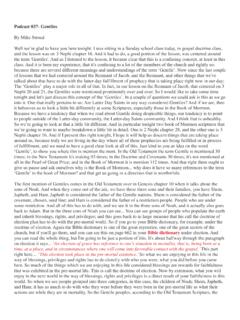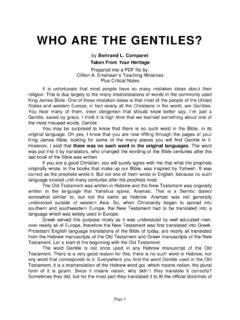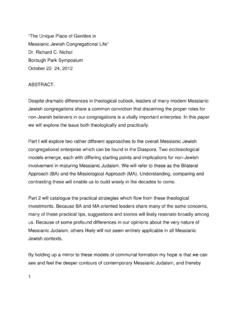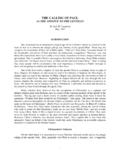Transcription of Should Christians Keep the Sabbath Day?
1 Should Christians keep the Sabbath Day? Are Christians required to keep the Sabbath Day? Should Christians worship on Saturday? Some christian groups insist that the Old Testament law of the Sabbath is still in force today and that Christians must worship on Saturday, the Jewish Sabbath . The purpose of this brief article is to explain why Christians worship on Sunday rather than on the Sabbath (Saturday). Definitions It may be helpful for the sake of clarity to define the terms Sabbath and Sabbath Day.
2 The word Sabbath is a Hebrew word that means cease or rest. The Sabbath day refers to the Jewish day of rest that is prescribed in the Ten Commandments: Remember the Sabbath day, to keep it holy (Exodus 20:8. All Scripture quotations are from the New King James Version). The Sabbath Day is observed on the seventh day of the week (from sundown on Friday to sundown on Saturday), because it was on the seventh day that God ceased or rested from the work of creation (Genesis 2:2-3). The Position of the Church of God The Church s official position is found in the Church of God Practical Commitments: Sunday is the christian day of worship.
3 As the Lord's Day, it commemorates the resurrection of Christ from the dead (Matthew 28:1) and Should be employed for worship, fellowship, christian service, teaching, evangelism, and proclamation (Acts 20:7; Romans 14:5, 6; 1 Corinthians 16:2; Colossians 2:16, 17). The first published listing of the Church of God Teachings cites Hosea 2:11; Romans 13:1-2; 14:5-6; and Colossians 2:16-17 as evidence that Christians are not obligated to keep the Sabbath (Church of God Evangel, August 15, 1910, p. 3).
4 The position of the Church of God that Christians are not required to observe the Sabbath is supported by the teachings of the New Testament and by Church history. The New Testament Teaching on the Sabbath The New Testament teaching on the Sabbath can be considered from three perspectives: 1. The Old Testament ceremonial laws, 2. Specific references to the Sabbath , and 3. Examples of christian worship. 1. The Old Testament ceremonial laws. The question of the Sabbath is directly related to the overall christian use of the Old Testament ceremonial laws.
5 Although Christianity arose from Judaism, the Sabbath Day (along with the sacrifices, circumcision, and food laws) is part of the ritual law from the Old Covenant that was fulfilled in Jesus Christ; and, therefore, is not required for Christians . It has been argued that the Sabbath requirement precedes the Law, but that argument is clearly false. Although God blessed the Sabbath Day in Genesis 2, He gave no command to observe the Sabbath , rest on the Sabbath , or worship on the Sabbath until Exodus 20:8.
6 In any case, the practices of sacrifice and circumcision both preceded the law of Moses, and these are not binding upon Christians because they too have been fulfilled in Christ (Galatians 6:15; Colossians 2:11). The decision to abandon the requirements of the ceremonial law came early in christian history. When a significant number of gentiles began to convert to Christianity, disputes arose about whether the Gentile Christians would be required to observe the Jewish laws about circumcision, dietary restrictions, Sabbath observance, and so forth.
7 Paul, Barnabas, Peter, James, and other Church leaders met in Jerusalem and decided, with the guidance of the Holy Spirit, that it was not necessary for Christians to observe the Sabbath rules and other aspects of the law of Moses (Acts 15:5-29). The decision of the Jerusalem Council is confirmed by the book of Hebrews, which declares that the Old Covenant has been replaced by the New Covenant, for the Old Covenant has passed away (Hebrews 8:13). Although Christians are not under the law as a means of salvation, we are still required to live righteously (Romans 6) and to keep God s commandments (1 John 5:2).
8 The New Testament instructs believers to obey all the Ten Commandments except for the commandment to keep the Sabbath Day. The Sabbath commandment is the only one of the Ten Commandments that is not repeated in the New Testament. Even after the decision of Acts 15, the Church experienced disputes about the Jewish rituals. Jewish believers tried to force everyone to obey the law of Moses, but Paul states clearly and repeatedly that Christians are not required to keep the laws regarding special days, kosher foods, and sacrifices.
9 He goes so far as to rebuke Peter when he acquiesced to Jewish pressure (Galatians 2:11). Paul takes issue with the Galatians by asking, But now after you have known God .. how is it that you turn again to the weak and beggarly elements, to which you desire again to be in bondage? (Galatians 4:9). What was the evidence of their turning back? Paul accused them, You observe days and months and seasons and years (Galatians 4:10). Paul also addresses the Sabbath in his letter to the Romans. In his discussion of christian liberty, he deals with such issues as acceptable meats and drinks, and he also mentions the Sabbath question.
10 Paul insists that Christians are free to observe or not observe the Sabbath according to their consciences. Paul states, One person esteems one day above another; another esteems every day alike. Let each be fully convinced in his own mind. He who observes the day, observes it to the Lord; and he who does not observe the day, to the Lord he does not observe it. He who eats, eats to the Lord, for he gives God thanks; and he who does not eat, to the Lord he does not eat, and gives God thanks (Romans 14:5-6).









